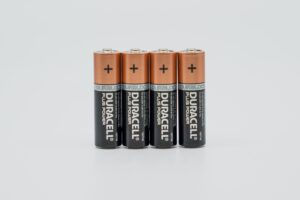Direct and Alternating Current are types of electrical current that we use to power our world. The type of electricity you are using may not be the first thing that comes to mind when you flip on a light switch or charge your phone. These two electrical currents have different purposes. Alternating Current is more widely used to power homes, businesses, and factories, whereas Direct Current is the electricity within batteries. But both Direct and Alternating Current play an important role in the technology we use today.
Direct Current

Direct current is an electrical current that only moves in one direction. Alessandro Volta, an Italian physicist and chemist, that made the original discovery of Direct Current. But it was Thomas Edison who put Direct Current to a practical use in powering his fluorescent light bulbs.
Presently, Direct Current is the electricity we use within batteries. In order to produce power, the voltage of Direct Currents charge is negative and must remain continuous. To sum up, the electricity within the battery flows on a path from the negative to the positive end of the battery.
In short, an easy way to identify products that use Direct Current, is to determine if the products are chargeable and wireless. With the use of a rectifier, we can change Alternating Current into Direct Current. An example of a rectifier is a USB power adapter. USB adapters plug into wall outlets and change the Alternating Current to Direct Current for electronics such as cell phones and laptops that operate on a battery.
Applications of Direct Current
Flashlights.
Laptops.
Cellphones.
Solar Panels.
Electric and Hybrid Vehicles.
Fuel Cells.
Advantages to Direct Current
Convenient to store regular or rechargeable batteries.
Produced by renewable energy.
Requires a continuous charge.
Alternating Current
Alternating Current is an electrical current where the current can change directions. As Thomas Edison was putting electric light into homes, Nicola Tesla was inventing a motor for another type of electrical current, Alternating Current. Soon after the invention of Alternating Current there was a great controversy about which current would supply power to residential homes and businesses. In the end, Alternating Current won the debate and became the selected source of current in powering electric light.
The electrons within alternating current jump back and forth as the electricity moves forward. This current travels on a frequency of 60 Hertz, therefore this means that the electrons change direction sixty times every second. In addition, alternating current is the main electrical current produced and used by consumers in Canada.
Alternating Current powers products that plug directly into outlets. Furthermore, Alternating Current is far more dangerous than Direct Current yet it has a lower cost to produce. Also, by way of a power inverter it is now possible to change Direct Current into Alternating Current. Solar panels are examples of energy producers that create electricity in Direct Current. With the use of a power inverter the Direct Current produced by renewable solar panels can be changed into Alternating Current that can be transported to homes and businesses.
Applications of Alternating Current
Appliances.
Light Bulbs.
Receptacles / Outlets.
Power Lines.
Main Electrical Grids.
Factories.
Advantages to Alternating Current
Inexpensive to produce.
Reliable in transmitting electricity from the power plant to consumer.
It is easy to interrupt the current, simply flip a breaker in the breaker panel.
The voltage and current can be lowered and raised by transformers. Therefore, Direct, and Alternating Currents both have unique functions in modern technology. As a result of rectifiers and power inverters it is possible to operate electrical products in the absence of the needed electrical current. As we are a society that runs on electricity, both Direct and Alternating Current play an important roll in the technology we use.




